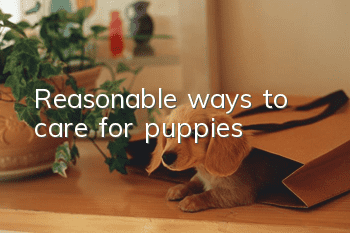Reasonable ways to care for puppies

For newborn puppies, they will appear at a loss when facing the surrounding environment. Every newborn puppy will be suckled for milk shortly after birth. During the first day or two of its life, a puppy absorbs from its mother's colostrum the antibodies it needs to survive its first six to ten weeks. Puppies need to pay attention to the following daily care:
1. Claw trimming
You may need to trim your puppy's claws between the ages of fourteen and twenty-one days because the puppy's kneading reflex while nursing can scratch the mother's belly. You must use baby nail clippers to trim your puppy's claws.
2. Sleep and rest
Just like babies, puppies are amazing at sleeping. A well-nourished puppy will only sleep and eat milk within a week after birth. Later, their activity gradually increases, and by around three weeks, they will be crawling staggeringly. By twelve to fourteen weeks, you will notice that your puppy's activity times vary between his original sleep cycles.
3. Keep the puppy warm
Temperature is an issue that must be paid careful attention to. The temperature for puppies to develop in the womb is 38.5 degrees. Although the temperature of the mother's body will drop before giving birth, it is still a test when the puppies are born wet. You should keep the room temperature at 30-33 degrees. Another method is to maintain a constant indoor temperature of 21 degrees and provide extra heat to the puppy's bed. Allow room temperature to drop by 3 degrees every two weeks. Soggy newborn puppies are susceptible to colds, but there will be no signs within 48 hours of birth that they have an overpowering infection. When newborn puppies are seven to ten days old, they cannot yet erect their fur to form an excellent protective layer. Therefore, their thermal regulation ability is very poor, and their body temperature often rises and falls with the surrounding environment. After seven days, some thermal regulation ability is achieved, but before four weeks of age, this ability is not particularly effective. This is why you want to provide supplemental heat for at least the first two weeks, even while the puppy is in the mother's litter.
4. Check the weak puppy
A healthy puppy feels dry, warm and plump to the touch, with normal skin elasticity. They will twist when picked up. A weak puppy will feel soft and wet, the skin will be inelastic, and the wrinkles will appear tent-like when pinched by hand. A happy, healthy litter of puppies will purr softly, punctuated by squeaks and squeals of hunger or feeding. Weak puppies won't settle down and will crawl around, waste energy and whine plaintively, and end up lying listlessly in a corner.
This is the reasonable care method for puppies!
Newborn puppies may seem at a loss about their surroundings. Every newborn puppy will be suckled for milk shortly after birth. During the first day or two of its life, a puppy absorbs from its mother's colostrum the antibodies it needs to survive its first six to ten weeks.
Most smallDogs rely entirely on breast milk for the first few weeks (make sure all the puppies in the litter get their share of the milk). Later it will be time to decide the best time to introduce solid foods and start weaning. The mother dog will keep the puppies clean and clean up their feces, so the newspapers in the whelping box must be changed frequently.
The newly born puppies are deaf and blind. It takes between ten and fourteen days to open your eyes, but you have to wait another seven days before you can see anything. Between thirteen and seventeen days after birth, hearing begins to function as the ear passages open.
- When is the best time to train a Border Collie? The best time to train a Border Collie!
- How to train a two-month-old Teddy to sit down? Teddy training method!
- What causes a dog’s nose to be dry? A must-read for beginners!
- What to do if a dog bites and attacks someone
- What should you pay attention to when dogs sleep with people?
- Is it okay to feed adult dogs once a day?
- These four types of dogs have fierce temperaments and are not suitable for novices to raise.
- If your dog doesn’t sleep in the kennel, how should you train your dog to get used to sleeping in the kennel?
- Is it better if Labrador is neutered?
- Is it enough for a dog to hit the quadruple?



